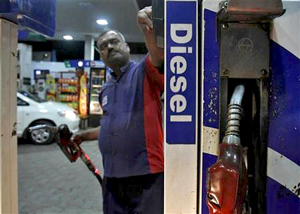 New Delhi, Sep 7: Government may announce more measures to curb fuel consumption later this month and raise diesel prices by close to 10 percent soon in a bid to cut the biggest item in its import bill and support the rupee, officials said.
New Delhi, Sep 7: Government may announce more measures to curb fuel consumption later this month and raise diesel prices by close to 10 percent soon in a bid to cut the biggest item in its import bill and support the rupee, officials said.
The world's fourth-biggest energy user is considering a 3-5 rupee increase in the price of diesel, which accounts for over 40 percent of fuel use, as it looks to cut oil costs by nearly $20 billion.
Rising global prices of crude oil and a slide in the rupee have left India facing an oil bill potentially 50 percent higher than on May 1.
"The timing and the quantum of the hike is a political decision," said a government official who declined to be named. "But it should happen. Political discussions are going on." The official said it would come sometime after the current parliament session ends on Saturday.
Foreign Minister Salman Khurshid said on Friday his oil ministry counterpart, M. Veerappa Moily, could announce steps to curb fuel consumption on September 16, when he gets back from a trip to South Korea and Japan.
"No matter what happens, we will have to cut down on fuel consumption," Khurshid told business channel CNBC TV18. "You can't keep subsiding the costs of fuel and not restrict the use of fuel." Khurshid provided no details on the possible steps.
Moily suggested ways to cut fuel import costs in letters to the prime minister and finance ministry a week ago, ranging from a street theatre campaign to encourage careful use of fuel to stepping up imports from Iran, which India pays for in rupees. The official said talks were also on with Iraq, India's biggest crude supplier, to pay in rupees for its oil.
Khurshid said Indians were increasingly realising the inevitability of moving away from government-controlled prices. "That's beginning to happen but has political implications," he said.
Fuel price rises generally provoke stiff resistance from opposition parties, and any increase now is expected to draw a bigger protest as India approaches a general election. The election must be held by May 2014.
SAVING BILLIONS ON SUBSIDIES?
India, where energy consumption per person is among the lowest in the world, has little elasticity in its fuel use as it tries to power exports and agriculture to help boost its economy and stave off a currency crisis.
The official said the government also hopes to be able to raise prices of cooking gas and kerosene, calculating the rupee's fall has added 350-400 billion rupees to its subsidy bill, which is budgeted at 650 billion for 2013/14.
These two fuels are used largely by India's poor and aspiring middle classes, making increases a hot political issue.
Diesel accounts for more than 40 percent of fuel demand, or about 1.4 million barrels per day (bpd), and the bulk of that is used by trucks, farmers and industry, which needs back-up generators to cope with frequent power blackouts.
Diesel demand has edged down 1.1 percent between April and July, Oil Secretary Vivek Rae told Reuters, largely due to reduced consumption by trucks as heavy monsoon rains in June and July hit road transport. The rains also reduced the need for farmers to run irrigation pumps.
Support from the government means diesel is now around 52 rupees a litre, some 10 rupees below market levels.
An increase of 5 rupees per litre on diesel could save as much as $4.3 billion in costs, Reuters calculations show. Total subsidies on fuel amount to about $25 billion a year, and India's crude oil import bill was $144 billion last fiscal year.
A previous price rise of 5 rupees a litre in September last year had little impact on consumption, and monthly increments of about 1 cent per litre from January 2013 have actually been wiped out by the falling rupee and higher global oil prices.
Bulk purchases were put on a market footing at the start of this year, but there has been little impact on consumption.
Overall use of fuel products rose 1.1 percent between April and July, Rae said, with petrol consumption up 11.4 percent. Motorcycles and scooters, which run only on petrol, are the backbone of private transport in India, where middle-class incomes are still too small for most families to afford cars.
The government has also asked the Petroleum Conservation Research Association, which works for the oil ministry, to report on the potential for curbs to oil consumption, the government official said.





Comments
Add new comment